In 2024, local SEO will continue to be a crucial aspect of digital marketing for businesses aiming to improve their local search rankings and attract more customers. As search engines evolve and consumer behaviour shifts, staying up-to-date with the latest local SEO ranking factors is essential for maintaining a solid online presence. According to a study by BrightLocal, 97% of consumers searched online for local businesses in 2023, emphasising the importance of local SEO
Local SEO helps businesses rank higher in local search results, making it easier for potential customers to find them when searching for products or services in their area. Moz’s 2023 Local Search Ranking Factors survey highlights the key elements that influence local rankings, such as Google My Business signals, review signals, and on-page optimisation.
To succeed in local SEO, businesses must optimise their online presence, such as Google My Business listings, on-page elements, customer reviews, and local link building.
This article will provide a comprehensive overview of the essential local SEO ranking factors in 2024, helping you understand how to improve your local search rankings and stay ahead of the competition.
What is Local SEO, and Why is it Important?
Local SEO (Search Engine Optimisation) is a strategic process that optimises a business’s online presence to attract more customers from relevant local searches. It optimises various aspects of a business’s digital footprint, such as its website, Google Business Profile, and online directory listings, to improve its visibility in location-specific search results.
The importance of local SEO for businesses must be balanced. 30% of all mobile searches are related to location and 76% of people who search for a nearby business on their smartphone visit that business within a day. This highlights the tremendous potential for companies to attract local customers through effective local SEO strategies.
By investing in local SEO, businesses can improve their chances of appearing in the local pack, a set of three highlighted business listings that appear at the top of search results for local queries. Appearing in the local pack can significantly increase a business’s visibility, as displayed above the organic search results. A study by Moz found that the local pack appears in the top spot for 93% of Google searches with local intent.
Furthermore, local SEO helps businesses build trust and credibility with potential customers. When a company appears in local search results, it signals to users that it is a legitimate and relevant option for their needs. This is particularly important for small businesses with a different brand recognition than larger, more established competitors.
Google My Business: The Cornerstone of Local SEO
Google My Business (GMB), now known as Google Business Profile, is the foundation of any successful local SEO strategy. A well-optimised GMB listing can significantly improve your business’s visibility in local search results and help you secure a spot in the coveted local pack. A complete and accurate GMB listing is the most critical factor for local pack rankings.
To get started, you must claim and verify your Google Business Profile. This process ensures you can control your business information and make necessary updates. Once verified, you can optimise your profile by providing accurate and detailed information, such as your business name, address, phone number (NAP), website URL, business hours, and categories. Consistency in NAP information across your website and online directories is crucial for local SEO success.
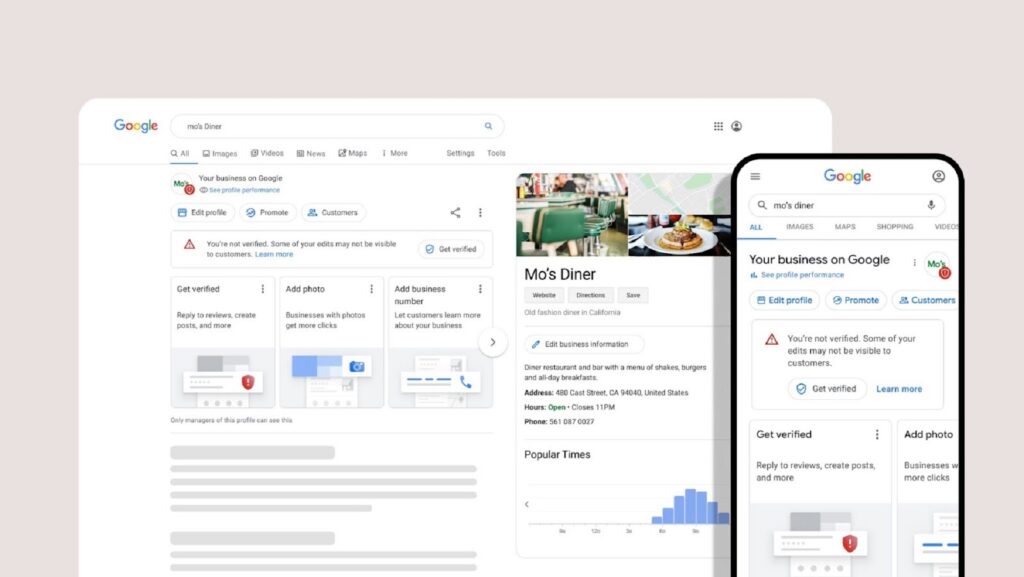
In addition to basic information, enhance your Google Business Profile with high-quality photos, engaging descriptions, and relevant attributes. Encourage customers to leave reviews on your profile, as they significantly influence local search rankings. According to BrightLocal’s 2023 Local Consumer Review Survey, 98% of consumers read online reviews for local businesses, and 85% trust them as much as personal recommendations.
Regularly updating your Google Business Profile with fresh content, such as posts and photos, can further boost your local SEO efforts. Google values active and engaging profiles, and this activity can positively impact your local pack rankings. Businesses that consistently publish GMB posts experience a 17% higher click-through rate and a 32% higher conversion rate than those that don’t.
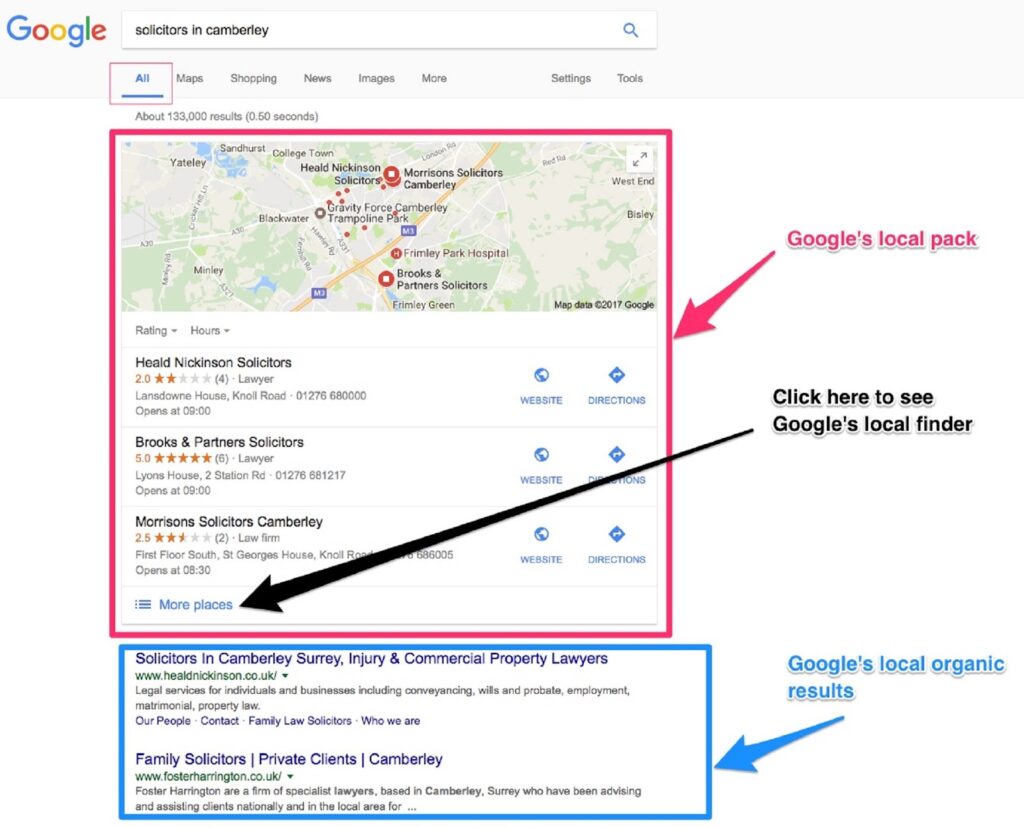
On-Page Optimisation for Local SEO
On-page optimisation is critical to local SEO and can significantly influence search rankings. By incorporating local keywords into your website’s landing pages, you can signal to search engines that your business is relevant to users searching for specific products or services in your area.
Incorporating Local Keywords in Landing Pages
When optimising your landing pages, focus on naturally integrating local keywords into your content, headers, meta descriptions, and URL structures. This helps search engines understand your website’s local relevance and can improve your local search ranking factors.
Ensuring NAP Consistency Across Your Website
Another essential aspect of on-page optimisation for local SEO is ensuring that your business’s name, address, and phone number (NAP) are consistent across your website. Consistent NAP information can be clear to search engines and positively impact local rankings. You can display your NAP prominently on your website, typically in the header or footer, and ensure it matches the information listed on your Google Business Profile and other online directories.
Creating Localised Content to Boost Relevance
Creating localised content is another effective way to boost your relevance for local searches. By developing content that focuses on local events, news, or issues, you can demonstrate your business’s involvement in the community and establish yourself as a local authority. This type of content can also help you attract local backlinks, another crucial local SEO ranking factor.
Additional On-Page Optimisation Factors
In addition to these on-page optimisation techniques, it’s crucial to ensure that your website is mobile-friendly and loads quickly. With most local searches occurring on mobile devices, having a responsive website that provides a seamless user experience can significantly impact your local search rankings and help you stay ahead of the competition.
The Power of Online Reviews in Local Search Rankings
Online reviews have become a powerful tool in influencing local search rankings and shaping the perception of businesses among potential customers. Studies have shown positive reviews can significantly impact a business’s visibility in local search results, particularly in the local pack and Google Maps listings. According to a survey by BrightLocal, 87% of consumers read online reviews for local businesses in 2020, and positive reviews make 73% of consumers trust a local business more.

The Influence of Positive Reviews on Local SEO
Positive reviews are among the most important local ranking factors, demonstrating a business’s reputation and credibility. When determining local search rankings, Google’s algorithm considers reviews’ quantity, quality, and recency. A study by Moz (https://moz.com/local-search-ranking-factors) found that review signals, such as the number of reviews and review diversity, account for 16% of the total ranking factors for the local pack.
Strategies to Encourage Customers to Leave Reviews
To boost your local search ranking and improve your online reputation, it’s essential to encourage customers to leave reviews actively. Some effective strategies include:
- Directly asking satisfied customers to leave a review
- Sending follow-up emails with a link to your Google My Business or other review profiles
- Offering incentives, such as discounts or loyalty points, for leaving a review (while adhering to platform guidelines)
- Provide clear instructions and links on your website and marketing materials to make it easy for customers to leave reviews.
Responding to Reviews to Enhance Your Local Reputation
Responding to positive and negative reviews is crucial for managing your local reputation and showing potential customers you value their feedback. A 2018 study by Harvard Business Review found that businesses that respond to reviews see a 12% increase in their average rating. When responding to reviews, be professional, empathetic, and solution-oriented. Address any concerns raised in negative reviews and thank customers for their positive feedback.\

By leveraging the power of online reviews, you can significantly boost your local search ranking and attract more customers to your business. You can encourage customers to leave reviews, respond to feedback professionally, and incorporate reviews into your local SEO strategy to boost your visibility in the local pack and Google Maps listings.
Local Link Building
The importance of local link-building for higher rankings cannot be overstated. Search engines view backlinks from reputable local websites as a vote of confidence in your business’s credibility and relevance to the local community. These local backlinks help search engines understand the context of your website and its relationship to other local companies, which can positively impact your local search rankings. Local link building is one of the top three SEO ranking factors, alongside a well-optimised Google Business Profile and consistent NAP (Name, Address, Phone) information.
Tactics to Acquire High-Quality Local Backlinks
There are several tactics you can employ to acquire high-quality local backlinks. One effective method is to partner with other local businesses and organisations to create valuable content or sponsor local events. By establishing these partnerships, you can earn backlinks from their websites while building relationships within your local community. You can also seek out local directories, industry-specific websites, and local news outlets to secure relevant backlinks to your business and location.
Leveraging Local Partnerships for Link-Building Opportunities
Leveraging local partnerships for link-building opportunities is another powerful strategy to boost your local SEO. Identify complementary businesses or organisations in your area and explore ways to collaborate on content, events, or charitable initiatives. For example, if you run a local restaurant, you could partner with a nearby brewery to create a unique dining experience and earn backlinks from each other’s websites. These regional partnerships provide link-building opportunities, help foster a sense of community, and increase your business’s visibility in local search results.
As you implement your local link-building strategies, focusing on quality over quantity is essential. A few high-quality, relevant local backlinks can significantly impact your local search rankings more than many low-quality or irrelevant links. Again, ensure that your website is optimised for local SEO, with a well-structured site hierarchy, localised content, and consistent NAP information across all online platforms, including your Google Business Profile and Google Maps listing.
Citations and Directories: Building Local Authority
Citations and directories are crucial in building local authority and improving your business’s visibility in local search results. A citation is any mention of your business’s name, address, and phone number (NAP) on other websites, even if there is no link to your website. These citations help search engines verify your business’s legitimacy and establish its relevance to specific locations and industries.
The Role of Citations in Local Search Rankings
Google takes citations into account when determining local search rankings. Consistent and accurate NAP information across various online directories and platforms strengthens your business’s credibility and authority in the eyes of search engines. The more high-quality citations your company has, the better its chances of ranking higher in local search results and attracting local customers.
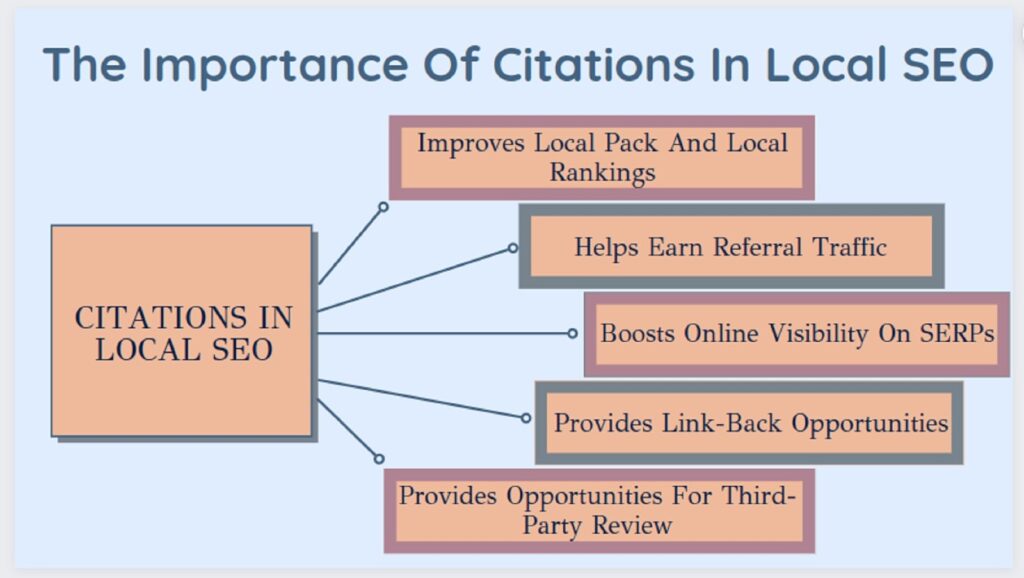
Ensuring Consistency in NAP Across Local Directories
Ensuring that your business’s NAP information is consistent across all local directories and online platforms is essential to maximise the impact of citations on your local SEO. Inconsistent NAP information can confuse search engines and harm your local search rankings. Use the same format and spelling for your business name, address, and phone number whenever you list your business on a new platform or directory.
Identifying the Most Valuable Citation Sources for Your Business
While getting your business listed on as many relevant directories as possible is essential, some citation sources are more valuable than others. You can focus on high-quality, industry-specific directories and local business listings relevant to your niche. Some of the most important citation sources include Google My Business, Yelp, Apple Maps, and Facebook. You can efficiently improve your local authority and boost your search rankings by identifying and prioritising your business’s most valuable citation sources.
User Engagement Signals and Local SEO
User engagement signals have become increasingly important for local SEO as search engines like Google prioritise websites that provide a positive user experience. These signals include click-through rates, time spent on site, bounce rates, and pages per session. A study by Moz (https://moz.com/local-search-ranking-factors) found that user engagement signals account for up to 11% of the total ranking factors for local search results, making them a crucial component of any comprehensive local SEO campaign.
The Influence of User Behaviour on Local Search Rankings
Local search engines interpret user engagement signals as indicators of a website’s relevance, quality, and usefulness to visitors. Websites that engage users and keep them on the site longer are more likely to rank higher in local search results. A survey revealed that 32% of local SEO professionals believe user engagement signals significantly impact local search rankings, highlighting their importance for local companies looking to improve their online visibility.
Optimising Your Website for User Experience and Engagement
You can focus on optimising your website for user experience to improve user engagement and boost your local search rankings. This includes ensuring your site is mobile-friendly, as mobile searches account for over 60% of all online searches. Also, improve your website’s loading speed, as a one-second delay in mobile load times can impact conversion rates by up to 20%.
Other ways to optimise for user engagement include:
- Creating high-quality, informative, and engaging content
- Implementing a clear and intuitive site navigation
- Using compelling calls-to-action (CTAs) to guide users through your site
- Incorporating visual elements, such as images and videos, to enhance the user experience
Monitoring and Analysing User Engagement Metrics
To assess the effectiveness of your user engagement optimisation efforts, regularly monitor and analyse critical metrics using tools like Google Analytics—track metrics such as bounce rates, time on site, pages per session, and conversion rates.
Mobile Optimisation: A Critical Local SEO Ranking Factor
Mobile optimisation has become a critical local SEO ranking factor as consumers rely on mobile devices to search for local businesses and services. With most local searches now occurring on mobile devices, having a mobile-friendly website is no longer optional—it’s necessary for any business looking to succeed in local search results.
The Growing Importance of Mobile-Friendliness for Local Search
Google has consistently emphasised the importance of mobile-friendliness in its search algorithms, with mobile-first indexing now being the default for all new websites. This means that Google primarily uses the mobile version of a website’s content for indexing and ranking purposes. As a result, local businesses that need to optimise their websites for mobile devices avoid being penalised in local search rankings and losing valuable traffic to their competitors.
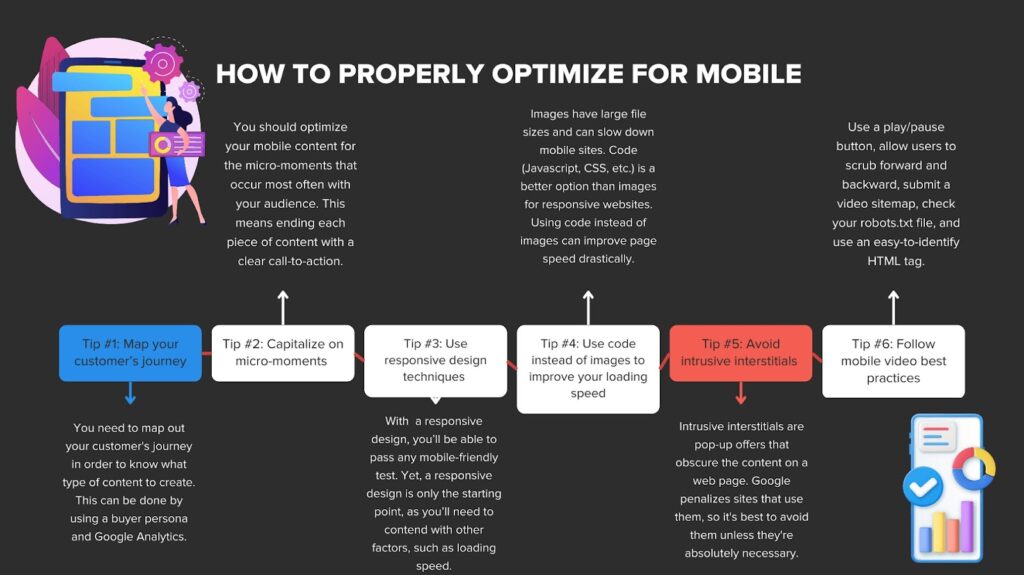
Best Practices for Optimising Your Website for Mobile Devices
To ensure that your website is mobile-friendly and optimised for local SEO, follow these best practices:
- Implement a responsive design that adapts to various screen sizes and devices
- Use large, easy-to-tap buttons and clear calls-to-action
- Optimise images and other media for fast loading on mobile networks
- Avoid using Flash or other technologies that are not supported on mobile devices
- Ensure that your website’s font sizes and spacing are easily readable on smaller screens
- Streamline your website’s navigation for easy access to key information and pages
The Impact of Mobile Page Speed on Local SEO Rankings
In addition to mobile-friendliness, page speed is a crucial factor in mobile optimisation and local SEO rankings. Slow-loading mobile pages frustrate users and signal to search engines that a website may need to provide a better user experience. To improve your mobile page speed, minimise HTTP requests, compress images and files, leverage browser caching, and reduce server response times.
Regularly test your website’s mobile-friendliness using tools like Google’s Mobile-Friendly Test, and continuously monitor and improve your mobile page speed to stay ahead of the competition in local search results.
Leveraging Social Media for Local SEO
Social media has become an increasingly important tool for local businesses looking to boost their online presence and improve their local SEO. While social media signals may not directly impact local search rankings, they can indirectly influence your visibility in local search results by increasing brand awareness, driving website traffic, and fostering engagement with your local community.
How Social Media Signals Affect Local SEO
Social media signals, such as likes, shares, and comments, can help search engines gauge the popularity and relevance of your local business. When your content is frequently shared and engaged with on social media platforms, it can increase brand exposure, higher website traffic, and more backlinks to your site. These factors can indirectly improve local SEO rankings, demonstrating your business’s authority and relevance within your local community.
To effectively promote your local business on social media, consider the following strategies:
- Create and optimise your business profiles on relevant social media platforms, such as Facebook, Instagram, and Twitter
- Share engaging, informative, and locally relevant content that resonates with your target audience
- Use local hashtags and geotags to increase your visibility among local users
- Run targeted social media ads to reach potential customers in your area
- Collaborate with other local businesses and influencers to expand your reach and credibility
- Encourage users to leave a review on your social media pages or Google My Business listing
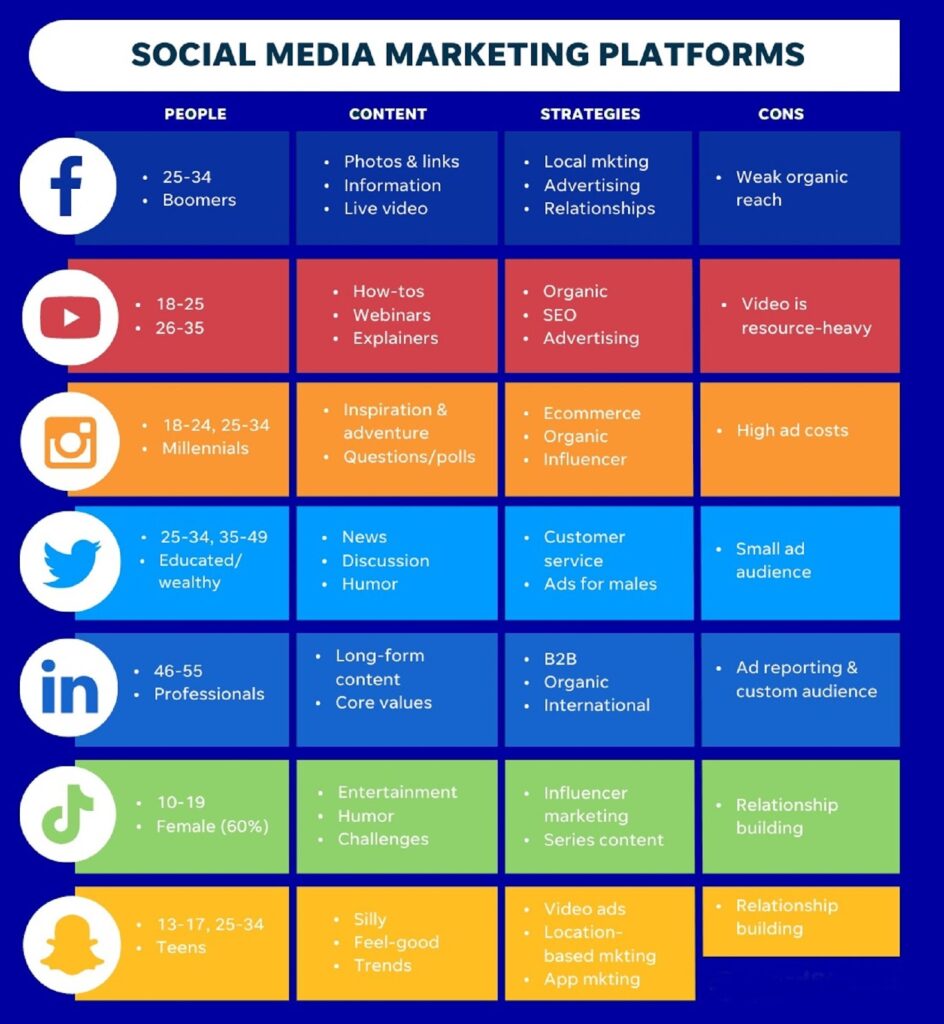
Engaging with Your Local Community Through Social Media
Social media allows local businesses to engage with their local community and build strong customer relationships. Respond promptly to comments, messages, chats and reviews on your social media profiles, showing that you value your customers’ feedback and care about their experiences. Participate in local discussions and events, and showcase your business’s involvement in the community through social media posts and updates.
The Future of Local SEO: Emerging Trends and Predictions
As the digital landscape evolves, local SEO strategies must adapt to emerging trends and technologies to remain effective. By staying ahead of the curve and embracing new opportunities, local businesses can maintain their competitive edge and continue attracting local customers in the coming years.
- Search engines are becoming increasingly sophisticated, mimicking human-like understanding, particularly activating Google’s RankBrain.
- The competition for top spots in local search results will intensify, putting greater pressure on businesses vying for prominence.
- Local search is becoming more precise, with geolocation and a consumer’s proximity to local businesses significantly influencing search results.
- Optimising websites for seamless navigation across various devices is crucial to meet consumer expectations.
- Google’s mobile index is poised to be the primary index for generating search results.
- As voice search gains traction and smartwatches become more prevalent, businesses must adapt strategies to accommodate the differences between spoken and typed searches, such as incorporating longer blog post titles and leveraging semantic keywords. Securing the top position in voice search results is critical, as only the best result is typically provided.
- Capitalising on micro-moments requires businesses to consistently publish high-quality, relevant content and keep their websites up to date, as search engine algorithms are adept at detecting content quality.
- The advent of neural algorithms and artificial intelligence is transforming the SEO landscape. Search engines are becoming more intelligent through continuous learning from user interactions. Ensuring content accurately reflects a business’s brand is more important than ever, as Google’s ability to discern inconsistencies has improved.
Unlocking Your Local SEO Potential: Embrace the Future of Local Search
In today’s digital age, a comprehensive local SEO strategy is essential for any business looking to succeed in their local market. By implementing the tips and best practices discussed in this guide, you can improve your website’s visibility, attract more local customers, and ultimately drive more revenue for your business.
As the digital landscape evolves, staying ahead of emerging trends and adapting your local SEO strategies will be crucial for long-term success. Embrace the future of local search by optimising voice search, adapting to zero-click searches, and leveraging new technologies and platforms to showcase your business innovatively.
If you’re ready to take your local SEO to the next level and dominate your local market, partner with Marketing One Group. Our local SEO experts will work closely with you to develop a customised strategy that drives results and helps your business thrive in the ever-changing world of local search.
